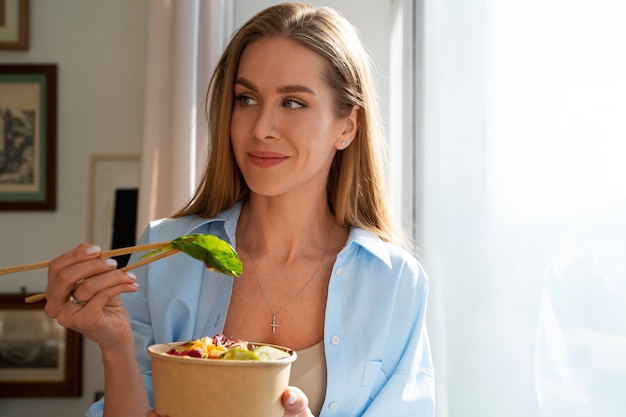
Did you try Veganuary this year, or are you thinking about going vegan or incorporating more plant-based meals into your diet? Dr. Gemma Newman has some useful tips that can help.
There are tons of diets out there—low fat, high fat, low carb, high carb, vegan, paleo, keto—it’s easy to get lost in the mix. You might wonder which one actually works and which is the best for you.
Veganuary is gaining traction each year. In 2018, 170,000 people signed up, which was a significant 183% increase from 2017. By last year, over 250,000 people had taken on the challenge, and the numbers continue to grow.
But you might ask, is a vegan diet really healthy? How is it different from other diets we hear are good for us? There’s been a lot of misinformation about nutrition over the years, partly due to media, food companies, and even health professionals.
Nonetheless, it’s hard to dispute the benefits of eating lots of vegetables and fruits, sticking to whole, unprocessed foods, and cutting back or eliminating processed meats, sugary snacks, fizzy drinks, and refined flours.
When people are confused about what’s healthy, many stick to their usual diet, often saying “everything in moderation.” But we don’t tell smokers to smoke in moderation, do we? The same goes for sugary drinks and processed meats.
Processed meats are actually classified as a group 1 carcinogen by the World Health Organization, indicating a clear cancer risk.
Dr. David Katz, a founder of the American College of Lifestyle Medicine, gathered top nutrition scientists to reach a general agreement on what constitutes a healthy diet. They agreed that a diet high in vegetables, fruits, beans, nuts, seeds, whole grains, and water is the foundation of good health.
If you compare paleo and whole food plant-based diets, they share more similarities with each other than either do with the average Western diet. This is especially evident in promoting heart health, as heart disease remains a top killer.
The only diet shown to reverse coronary artery blockages within weeks is the whole food plant-based diet. Backed by studies published in The Lancet in 1990, and more recently in the Mount Abu Heart Trial, no other dietary plan has replicated these findings. Given that heart disease is the leading cause of death, a mostly plant-based diet appears to be the sensible choice unless new evidence suggests otherwise.
Transitioning to a plant-based diet can seem daunting, especially if you’re used to a typical Western diet. However, with some help, it can be manageable and rewarding.
If you’re thinking of starting a plant-based diet, some cookbooks can make the transition easier. “So Vegan in 5” by Roxy Pope and Ben Pook offers over 100 simple recipes using just five ingredients available at most supermarkets. Meanwhile, “BOSH!” by Henry Firth & Ian Theasby provides over 80 healthy vegan recipes, and their online channel features popular recipe videos with millions of views.
Another useful tip is to explore vegan hashtags on Instagram for inspiration on how others have made the switch to plant-based eating.
It’s often best to start with foods you already enjoy. For instance, if you like chicken curry, try making a chickpea curry instead. Swap beef Bolognese for lentil Bolognese or make a three-bean chili instead of a meat-based one. Enjoying these vegan versions of your favorite dishes is a great start.
Begin by changing your breakfast to a plant-based one a few times a week, then gradually do the same with other meals. As you get used to it, you can increase the number of plant-based meals until they largely replace your old eating habits.
If you switch to a whole food plant-based diet right away, you may start feeling the benefits within two to three weeks. However, be prepared for some initial bloating or gas as your gut adjusts.
Both the American Dietetic Association and the British Dietetic Association agree that well-planned plant-based diets can support healthy living for all age groups and might help prevent diseases like heart disease, cancer, and chronic respiratory disorders.
We’re now facing nutrient depletion due to factors like monocropping and pesticide use. A typical Western Diet often lacks essential nutrients like magnesium, folate, and fiber, and is linked to obesity and chronic illnesses. A well-planned whole food plant-based diet, especially one following the “nutritarian approach,” can be nutrient-dense and highly beneficial.
If you avoid all animal products, you’ll need some supplements. Vitamin B12 is essential since it’s not commonly found in plants. Adults need about 1.5 micrograms a day, but it’s recommended to take at least 10 micrograms daily or 2000 micrograms weekly to ensure adequate intake.
Vitamin D is also important, especially if you don’t get enough sunlight. Aim for at least 1000 IU daily if your levels are normal, and 2000 IU if they’re low.
EPA/DHA supplements, made from algae, are another good option. These omega-3 fatty acids benefit heart health without the risks associated with fish oils.
Furthermore, incorporating foods like flaxseeds into your diet can lower blood pressure and improve heart health. Add a tablespoon of milled flax into your meals daily.
Dr. Gemma Newman has worked in medicine for 15 years and is the Senior Partner at a family medical practice. She studied at the University of Wales College of Medicine and has worked in various specialties including elderly care, endocrinology, pediatrics, and general practice.




